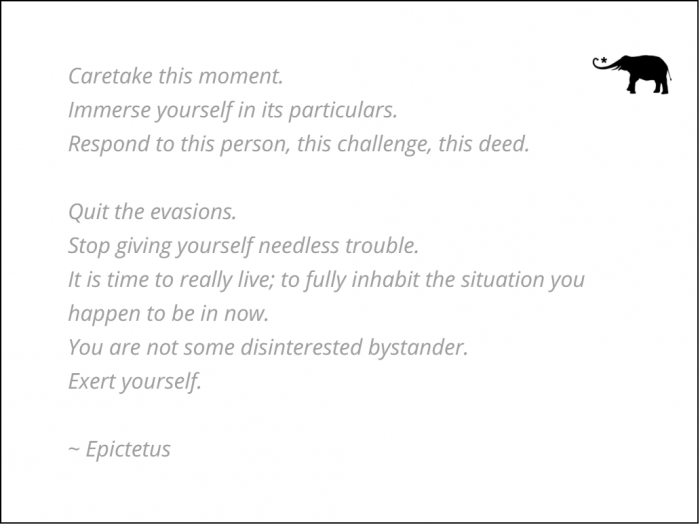I might have too many books.
Or not enough shelves. It’s really a glass-half-full or half-empty kind of thing. Sometimes when I am adding to my collection, I need one more book to make free shipping, and usually, I buy the same title—to give it away. The title is The Art of Living, which is also known as The Handbook, or Enchiridion by Epictetus, the Stoic philosopher. It’s a small, thin book and not particularly intimidating to look at as far as books go.
I often marvel at the fact that I can pick up my phone, order these ancient words and have them arrive on my porch, hand-delivered by a uniformed employee of the federal government. I gave one of these copies to our delivery driver at work.
I explained to him, “This book was written by an illiterate enslaved person, Epictetus, and recorded by his student Arrian. I bought it with my phone to make free shipping and thought you might like it.” After some of the conversations we had while working, an Ancient Greek Stoic philosopher wasn’t much of a stretch. I pointed him to a particular quote, one I carry in my wallet.
Caretake this moment.
Immerse yourself in its particulars.
Respond to this person, this challenge, this deed.
Quit the evasions.
Stop giving yourself needless trouble.
It is time to really live; to fully inhabit the situation you happen to be in now.
You are not some disinterested bystander.
Exert yourself.
As concerns the art of living, the material is your own life.
No great thing is created suddenly.
There must be time.
Give your best and always be kind.
~ Epictetus 50-135 CE
This book came to me at a point in my life where everything was spiraling and I was deeply worried about my past and my future. I carried the quote in my wallet, covered with packing tape to keep it sturdy. The words reached through millennia and they grounded me time after time as I slid my fingers over them. Caretake. This moment. I would tell myself, “Take care of now, give your best now. Be present.”
For me, caretaking is giving that moment what it needs. A plant needs water and sun, but it’s going to do what plants do; I am just helping along. Those moments in my life needed their own version of water and sun. When I am caretaking, I do this out of love for myself and others. Caretaking is responding, not reacting—and these are two different things. I try to take into account what is being responded to with concern for the outcome, everyone’s outcome, not just mine.
Advice to “fully inhabit the situation I happen to be in” sounds strange coming from an illiterate former enslaved person, but my grandma had a different way of putting it. She said, “Grow where you’re planted.” Things could be different, but they are not. Being present in this moment, fully inhabiting it, keeps me from mulling over what could be or what might have been, which is truly wasted energy. “Now” has its own depths to plumb.
Epictetus points out that no great thing is created suddenly. The material is my own life—and what am I going to do with my one precious life? How can I participate? In the Five Remembrances, we are reminded “My actions are the ground upon which I stand.” But whether the words come from a Stoic philosopher or a Buddhist monk, the message is the same. We start with now, the present moment. My actions are the woven tapestry that is the material of my life.











Read 2 comments and reply